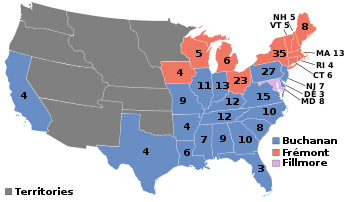1856 U.S. presidential election
|
|
|||||||||||||||||||||||||||||||||||||
|---|---|---|---|---|---|---|---|---|---|---|---|---|---|---|---|---|---|---|---|---|---|---|---|---|---|---|---|---|---|---|---|---|---|---|---|---|---|
|
|||||||||||||||||||||||||||||||||||||
|
All 296 electoral votes of the Electoral College 149 electoral votes needed to win |
|||||||||||||||||||||||||||||||||||||
| Turnout | 78.9% |
||||||||||||||||||||||||||||||||||||
|
|||||||||||||||||||||||||||||||||||||
|
Presidential election results map. Blue denotes states won by Buchanan/Breckinridge, red denotes those won by Frémont/Dayton, and lilac denotes those won by Fillmore/Donelson. Numbers indicate the number of electoral votes allotted to each state.
|
|||||||||||||||||||||||||||||||||||||
|
|||||||||||||||||||||||||||||||||||||
The United States presidential election of 1856 was the 18th quadrennial presidential election, held on Tuesday, November 4, 1856. Incumbent president Franklin Pierce was defeated in his effort to be re-nominated by the Democratic Party. James Buchanan, an experienced politician who had held a variety of political offices, was serving as the United States Ambassador to the United Kingdom and won the nomination instead.
Slavery was the omnipresent issue, while the Whig Party, which had since the 1830s been one of the two major parties in the U.S., had disintegrated. New parties such as the Republican Party (strongly against slavery’s expansion) and American, or “Know-Nothing,” Party (which ignored slavery and instead emphasized anti-immigration and anti-Catholic policies), competed to replace it as the principal opposition to the Democratic Party. The Republican Party nominated John C. Frémont of California as its first presidential candidate. The Know-Nothing Party nominated former President Millard Fillmore, of New York.
Frémont condemned the Kansas–Nebraska Act, and decried the expansion of slavery. Buchanan warned that the Republicans were extremists whose victory would lead to civil war. The Democrats endorsed popular sovereignty as the method to determine slavery’s legality for newly admitted states. Buchanan won a plurality of the popular vote, but a majority of the Electoral College, and defeated Fillmore and Frémont, with the latter receiving fewer than twelve hundred popular votes in the slave states, with all of these coming from Civil War border states. The results in the Electoral College indicated that the Republican Party could possibly win the next presidential election by capturing only two more states; indeed, 1856 proved to be the last Democratic presidential victory before 1884. The 1856 election also marks the last time that a Democrat had been elected to succeed a fellow Democrat as president without the previous president having died in office.
...
Wikipedia





